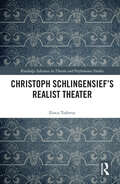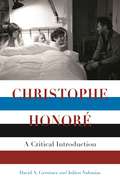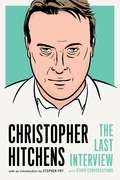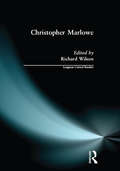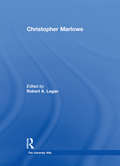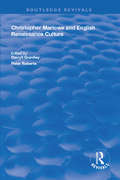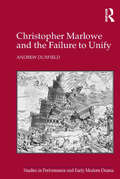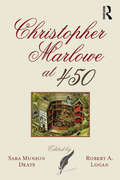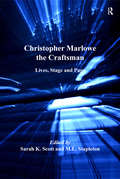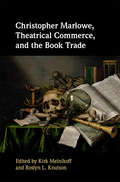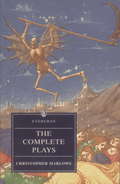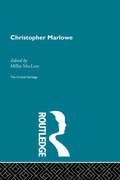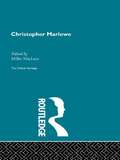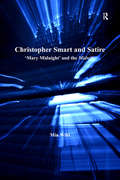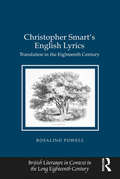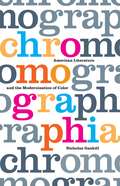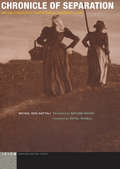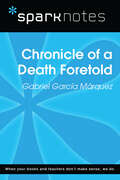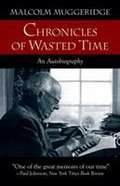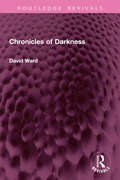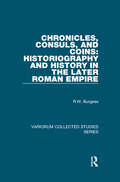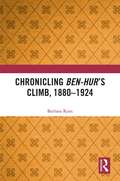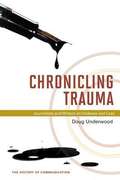- Table View
- List View
Christoph Schlingensief's Realist Theater (Routledge Advances in Theatre & Performance Studies)
by Ilinca TodorutThis book is the first study of the prolific German filmmaker, performance artist, and TV host Christoph Schlingensief (1960–2010) that identifies him as a practitioner of realism in the theater and lays out how theatrical realism can offer an aesthetic frame sturdy enough to hold together his experiments across media and genres. This volume traces Schlingensief’s developing realism through his theater work in conventional theater venues, in less conventional venues, his opera work focusing on the production of Wagner’s Parsifal at Bayreuth, and his art installations on revolving platforms called Animatographs. This book will be of great interest to scholars of theater, film, and performance art and practitioners.
Christophe Honoré: A Critical Introduction (Contemporary Approaches to Film and Media Series)
by David A. Gerstner Julien NahmiasFrench filmmaker Christophe Honoré challenges audiences with complex cinematic form, intricate narrative structures, and aesthetically dynamic filmmaking. But the limited release of his films outside of Europe has left him largely unknown to U.S. audiences. In Christophe Honoré: A Critical Introduction, authors David A. Gerstner and Julien Nahmias invite English-speaking scholars and cinéastes to explore Honoré's three most recognized films, Dans Paris (2006), Les Chansons d'amour (2007), and La Belle personne (2008)--"the trilogy." Gerstner and Nahmias analyze Honoré's filmmaking as the work of a queer auteur whose cinematic engagement with questions of family, death, and sexual desire represent new ground for queer theory. Considering each of the trilogy films in turn, the authors take a close look at Honoré's cinematic technique and how it engages with France's contemporary cultural landscape. With careful attention to the complexity of Honoré's work, they consider critically contested issues such as the filmmaker's cinematic strategies for addressing AIDS, the depth of his LGBTQ politics, his representations of death and sexual desire, and the connections between his films and the New Wave. Anchored by a comprehensive interview with the director, the authors incorporate classical and contemporary film theories to offer a range of cinematic interventions for thinking queerly about the noted film author. Christophe Honoré: A Critical Introduction reconceptualizes the relationship between film theory and queer theory by moving beyond predominant literary and linguistic models, focusing instead on cinematic technique. Students and teachers of queer film will appreciate this thought-provoking volume.
Christopher Columbus's Naming in the 'diarios' of the Four Voyages (1492-1504)
by Evelina GuzauskyteIn this fascinating book, Evelina Gužauskytė uses the names Columbus gave to places in the Caribbean Basin as a way to examine the complex encounter between Europeans and the native inhabitants.Gužauskytė challenges the common notion that Columbus's acts of naming were merely an imperial attempt to impose his will on the terrain. Instead, she argues that they were the result of the collisions between several distinct worlds, including the real and mythical geography of the Old World, Portuguese and Catalan naming traditions, and the knowledge and mapping practices of the Taino inhabitants of the Caribbean. Rather than reflecting the Spanish desire for an orderly empire, Columbus's collection of place names was fractured and fragmented - the product of the explorer's dynamic relationship with the inhabitants, nature, and geography of the Caribbean Basin.To complement Gužauskytė's argument, the book also features the first comprehensive list of the more than two hundred Columbian place names that are documented in his diarios and other contemporary sources.
Christopher Hitchens: and Other Conversations
by Christopher Hitchens“If someone says I’m doing this out of faith, I say, Why don’t you do it out of conviction?” —CHRISTOPHER HITCHENS One of his generation’s greatest public intellectuals, and perhaps its fiercest, Christopher Hitchens was a brilliant interview subject. This collection—which spans from his early prominence as a hero of the Left to his controversial support for the wars in Iraq and Afghanistan toward the end of his life— showcases Hitch’s trademark wit on subjects as diverse as his mistrust of the media, his love of literature, his dislike of the Clintons, and his condemnation of all things religious. Beginning with an introduction and tribute from his longtime friend Stephen Fry, this collection culminates in Hitchens’s fearless final interview with Richard Dawkins, which shows a man as unafraid of death as he was of everything in life.
Christopher Marlowe (Longman Critical Readers)
by Richard WilsonChristopher Marlowe has provoked some of the most radical criticism of recent years. There is an elective affinity, it seems, between this pre-modern dramatist and the post-modern critics whose best work has been inspired by his plays. The reason suggested by this collection of essays is that Marlowe shares the post-modern preoccupation with the language of power - and the power of language itself. As Richard Wilson shows in his introduction, it is no accident that the founding essays of New Historicism were on Marlowe; nor that current Queer Theorists focus so much on his images of gender and homosexuality. Marlowe staged both the birth of the modern author and the origin of modern sexual desire, and it is this unique conjunction that makes his drama a key to contemporary debates about the state and the self: from pornography to gays in the military.Gay Studies, Cultural Materialism, New Historicism and Reader Response Criticism are all represented in this selection, which the introduction places in the light not only of theorists like Althusser, Bataille and Bakhtin, but also of artists and writers such as Jean Genet and Robert Mapplethorpe. Many of the essays take off from Marlowe's extreme dramatisations of arson, cruelty and aggression, suggesting why it is that the thinker who has been most convincingly applied to his theatre is the philosopher of punishment and pain, Michel Foucault. Others explore the exclusiveness of this all-male universe, and reveal why it remains so offensive and impenetrable to feminism. For what they all make disturbingly clear is Marlowe's violent, untamed difference from the clichés and correctness of normative society.
Christopher Marlowe (The University Wits)
by Robert A. LoganIn uncovering the origin of the designation 'University Wits', Bob Logan examines the characteristics of the Wits and their influence on the course of Elizabethan drama. For the first time, Christopher Marlowe is placed in the context of the six University Wits, where his reputation stands out as the most prominent, and the impact of his university education on his works is clarified. The essays selected for reprinting assess the most significant scholarship written about Marlowe, including biographical studies, challenges to familiar assumptions about the poet/playwright and his works, compositions on groupings of his works, on individual works, and on subjects particular to Marlowe. Unique in its perspective and in the collection of essays, this book will interest all students and scholars of Renaissance poetry, drama, and specialized cultural contexts.
Christopher Marlowe and English Renaissance Culture (Routledge Revivals)
by Peter Roberts Darryll GrantleyFirst published in 1996, this volume asked the question: who – and what – was Christopher Marlowe? Dramatist, poet, atheist and possible spy, he was a man in contrast with his time. The authors here gather to explore Marlowe on the four hundredth anniversary of his death. They include significant interdisciplinary elements and focus on dramaturgy, textual criticism and biography. It is hoped that the diversity of approaches can further debates on both Marlowe and Renaissance culture.
Christopher Marlowe and the Failure to Unify (Studies in Performance and Early Modern Drama)
by Andrew DuxfieldIn this sustained full length study of Marlowe's plays, Andrew Duxfield argues that Marlovian drama exhibits a marked interest in unity and unification, and that in doing so it engages with a discourse of anxiety over social discord that was prominent in the 1580s and 1590s. In combination with the ambiguity of the plays, he suggests, this focus produces a tension that both heightens dramatic effect and facilitates a cynical response to contemporary evocations of and pleas for unity. This book has three main aims. Firstly, it establishes that Marlowe’s tragedies exhibit a profound interest in the process of reduction and the ideal of unity. Duxfield shows this interest to manifest itself in different ways in each of the plays. Secondly, it identifies this interest in unity and unification as an engagement in a cultural discourse that was particularly prevalent in England during Marlowe’s writing career; during the late 1580s and early 1590s heightened inter-confessional tension, the threat and reality of foreign invasion and public puritan dissent in the form of the Marprelate controversy provoked considerable public anxiety about social discord. Thirdly, the book considers the plays’ focus on unity in relation to their marked ambiguity; throughout all of the plays, unifying ideals and reductive processes are consistently subject to renegotiation with, or undercut entirely by, the complexity and ambiguity of the dramas in which they feature. Duxfield’s focus on unity as a theme throughout the plays provides a new lens through which to examine the place of Marlowe’s work in its cultural moment.
Christopher Marlowe at 450
by Sara Munson Deats Robert A. LoganThere has never been a retrospective on Christopher Marlowe as comprehensive, complete and up-to-date in appraising the Marlovian landscape. Each chapter has been written by an eminent, international Marlovian scholar to determine what has been covered, what has not, and what scholarship and criticism will or might focus on next. The volume considers all of Marlowe’s dramas and his poetry, including his translations, as well as the following special topics: Critical Approaches to Marlowe; Marlowe’s Works in Performance; Marlowe and Theatre History; Electronic Resources for Marlovian Research; and Marlowe’s Biography. Included in the discussions are the native, continental, and classical influences on Marlowe and the ways in which Marlowe has interacted with other contemporary writers, including his influence on those who came after him. The volume has appeal not only to students and scholars of Marlowe but to anyone interested in Renaissance drama and poetry. Moreover, the significance for readers lies in the contributors’ approaches as well as in their content. Interest in the biography of Christopher Marlowe and in his works has bourgeoned since the turn of the century. It therefore seems especially appropriate at this time to present a comprehensive assessment of past and present traditional and innovative lines of inquiry and to look forward to future developments.
Christopher Marlowe in Context
by Emma Smith Emily C. BartelsThe life and death of Christopher Marlowe has long been shrouded in mystery and subject to speculation. One of the foremost dramatists of his day, Marlowe and his writings exerted an influence not only on the work of his contemporaries, including Shakespeare, but also on literary culture to the present. Setting Marlowe's writings in their historical context, this collection showcases the most exciting critics writing on critical and contextual approaches to his poems and plays, discussing both major and lesser-known works. In three sections, 'Marlowe's works', 'Marlowe's world', and 'Marlowe's reception,' short chapters tell a story ranging from classical literature through to modern cinema. Other topics covered include religion, geography, audience, and women. Chapters on the critics and Marlowe now show how and why his works continue to resonate and a comprehensive further reading list provides helpful suggestions for those who want to find out more.
Christopher Marlowe the Craftsman: Lives, Stage, and Page
by M.L. StapletonContributions to this volume explore the idea of Marlowe as a working artist, in keeping with John Addington Symonds' characterization of him as a "sculptor-poet." Throughout the body of his work-including not only the poems and plays, but also his forays into translation and imitation-a distinguished company of established and emerging literary scholars traces how Marlowe conceives an idea, shapes and refines it, then remakes and remodels it, only to refashion it further in his writing process. These essays necessarily overlap with one another in the categories of lives, stage, and page, which signals their interdependent nature regarding questions of authorship, theater and performance history, as well as interpretive issues within the works themselves. The contributors interpret and analyze the disputed facts of Marlowe's life, the textual difficulties that emerge from the staging of his plays, the critical investigations arising from analyses of individual works, and their relationship to those of his contemporaries. The collection engages in new ways the controversies and complexities of its subject's life and art. It reflects the flourishing state of Marlowe studies as it shapes the twenty-first century conception of the poet and playwright as master craftsman.
Christopher Marlowe, Theatrical Commerce, and the Book Trade
by Kirk Melnikoff Roslyn L. KnutsonPresenting the first exploration of Christopher Marlowe's complex place in the canon, this collection reads Marlowe's work against an extensive backdrop of repertory, publication, transmission, and reception. Wide-ranging and thoughtful chapters consider Marlowe's deliberate engagements with the stage and print culture, the agents and methods involved in the transmission of his work, and his cultural reception in the light of repertory and print evidence. With contributions from major international scholars, the volume considers all of Marlowe's oeuvre, offering illuminating approaches to his extended animation in theatre and print, from the putative theatrical debut of Tamburlaine in 1587 to the most current editions of his work.
Christopher Marlowe: Complete Plays (The Everyman Library #102)
by Christopher Marlowe J. M. DentTheir texts fully restored by recent scholarship, Marlowe's astonishing works can now be appreciated as originally written. For the first time, this edition boasts the complete plays - including two versions of Doctor Faustus.Blasphemy, perversion, defiance and transgression ... in a series of compelling tragedies, Marlowe challenged every authority of heaven and earth. From the proud wrath of Tamburlaine, the tyrant of Asia, to the racked anguish of Edward II, himself in thrall to unspeakable desires; from God's own Machiavel, the Duke of Guise, to Barabas, the Jew of Malta, curse of Christianity: all are taboo-breakers, to be broken in their turn. And in the tragedy of Doctor Faustus we perhaps read Marlowe's own: a tale of brilliance and audacity - and of terrible, inexorable punishment.Their texts fully restored by recent scholarship, Marlowe's astonishing works can now be appreciated as originally written. For the first time, this edition boasts the complete plays - including two versions of Doctor Faustus.
Christopher Marlowe: The Critical Heritage (Critical Heritage Ser.)
by Millar MacLureThis book begins with the malignant taunts of Robert Greene and the adulatory remarks of Christopher Marlowe's friends and literary associates, and ends with the abrasive comments of the younger G. B. Shaw and the rhapsodies of Swinburne.
Christopher Marlowe: The Plays and Their Sources
by Mrs Vivien Thomas Vivien Thomas Prof William Tydeman William TydemanThis major work brings together, for the first time in a single volume, all the recognized sources of Marlowe's dramatic work. Many of the forty-two texts presented here are of outstanding interest in their own right. Together they illuminate the cultural milieu which fostered Marlowe's talent, and deepen our appreciation of his dramatic methods. * Each of the texts is accessibly presented for the modern reader and is fully annotated. * Works in Latin or foreign vernaculars are translated, many for the first time, and modern spelling and punctuation are used throughout. * The sources for each play are examined individually and are thoroughly edited. Few libraries provide the range of sources contained in this one volume. The editors include texts of works such as the English Faust-Book from which Marlowe borrowed heavily, and provide substantial extracts from other books with which he was no doubt familiar. This book is an invaluable resource for all those interested in Marlowe and the development of Elizabethan theatre.
Christopher Smart and Satire: 'Mary Midnight' and the Midwife
by Min WildChristopher Smart and Satire explores the lively and idiosyncratic world of satire in the eighteenth-century periodical, focusing on the way that writers adopted personae to engage with debates taking place during the British Enlightenment. Taking Christopher Smart's audacious and hitherto underexplored Midwife, or Old Woman's Magazine (1750-1753) as her primary source, Min Wild provides a rich examination of the prizewinning Cambridge poet's adoption of the bizarre, sardonic 'Mary Midnight' as his alter-ego. Her analysis provides insights into the difficult position in which eighteenth-century writers were placed, as ideas regarding the nature and functions of authorship were gradually being transformed. At the same time, Wild also demonstrates that Smart's use of 'Mary Midnight' is part of a tradition of learned wit, having an established history and characterized by identifiable satirical and rhetorical techniques. Wild's engagement with her exuberant source materials establishes the skill and ingenuity of Smart's often undervalued, multilayered prose satire. As she explores Smart's use of a peculiarly female voice, Wild offers us a picture of an ingenious and ribald wit whose satirical overview of society explores, overturns, and anatomises questions of gender, politics, and scientific and literary endeavors.
Christopher Smart's English Lyrics: Translation in the Eighteenth Century (British Literature in Context in the Long Eighteenth Century)
by Rosalind PowellIn the first full-length study of Christopher Smart’s translations and the place and function of translation in Smart’s poetry, Rosalind Powell proposes a new approach to understanding the relationship between Smart’s poetics and his practice. Drawing on translation theory from the early modern period to the present day, this book addresses Smart's translations of Horace, Phaedrus and the Psalms alongside the better-known religious works such as Jubilate Agno and A Song to David. Five recurrent threads run throughout Powell’s study: the effect of translation on the identity of a narrative voice in a rewritten text; the techniques that are used to present translated texts to a new literary, cultural and linguistic readership; performance and reading contexts; the translation of great works as an attempt to achieve literary permanence; and, finally, the authorial influence of Smart himself in terms of the overt religiosity and nationalism that he champions in his writing. In exploring Smart’s major translation projects and revisiting his original poems, Powell offers insights into classical reception and translation theory; attitudes towards censorship; expressions of nationalism in the period; developments in liturgy and hymnody; and the composition of children’s books and school texts in the early modern era. Her detailed analysis of Smart’s translating poetics places them within a new, contemporary context and locality to uncover the poet's works as a coherent project of Englishing.
Chromographia: American Literature and the Modernization of Color
by Nicholas GaskillThe first major literary and cultural history of color in America, 1880–1930Chromographia tells the story of how color became modern and how literature, by engaging with modern color, became modernist. From the vivid pictures in children&’s books to the bold hues of abstract painting, from psychological theories of perception to the synthetic dyes that brightened commercial goods, color concerned both the material stuff of modernity and its theoretical and artistic formulations. Chromographia spans these diverse practices to reveal the widespread effects on U.S. literature and culture of the chromatic revolution that unfolded at the turn of the twentieth century.In analyzing color experience through the lens of U.S. writers (including Charlotte Perkins Gilman, L. Frank Baum, Stephen Crane, Charles Chesnutt, Gertrude Stein, Nella Larsen, and William Carlos Williams), Chromographia argues that modern aesthetic techniques are inseparable from the theories and technologies that drove modern color. Nicholas Gaskill shows how literature registered the social worlds within which chromatic technologies emerged, and also experimented with the ideas about perception, language, and the sensory environment that accompanied their proliferation.Chromographia is the only study of modern color in U.S. literature. It presents a new reading of perception in literature and a theory of experience that uses color to move beyond the usual divisions of modern thought.
Chronicle of Separation: On Deconstruction’s Disillusioned Love (Idiom: Inventing Writing Theory)
by Michal Ben-NaftaliA unique feminist approach to the legacy of Jacques Derrida, Chronicle of Separation is a disparate yet beautifully interwoven series of distinct readings, genres, and themes, offering a powerful reflection of love in—and as—deconstruction. Looking especially at relationships between women, Ben-Naftali provides a wide-ranging investigation of interpersonal relationships: the love of a teacher, the anxiety-ridden bond between a mother and daughter as manifested in anorexia, passion between two women, love after separation and in mourning, the tension between one’s self and the internalized other. Traversing each of these investigations, Chronicle of Separation takes up Derrida’s Memoires for Paul de Man and The Post Card, Lillian Hellman’s famed friendship with a woman named Julia, and adaptations of the biblical Book of Ruth. Above all, it is a treatise on the love of theory in the name of poetry, a passionate book on love and friendship.
Chronicle of a Death Foretold (SparkNotes Literature Guide Series)
by SparkNotesChronicle of a Death Foretold (SparkNotes Literature Guide) by Gabriel Garcia Marquez Making the reading experience fun! Created by Harvard students for students everywhere, SparkNotes is a new breed of study guide: smarter, better, faster.Geared to what today's students need to know, SparkNotes provides:chapter-by-chapter analysis explanations of key themes, motifs, and symbols a review quiz and essay topics Lively and accessible, these guides are perfect for late-night studying and writing papers.
Chronicles Of Wasted Time: An Autobiography
by Malcolm MuggeridgeBack in print for the first time since Muggeridge's death in 1990, both published volumes of his acclaimed biography-The Green Stick and The Infernal Grove, plus the previously unpublished start to an unfinished third volume entitled The Right Eye-all brought together in one unabridged volume. <P><P>Born in 1903, Malcolm Muggeridge started his career as a university lecturer in Cairo before taking up journalism. As a journalist he worked around the world on the Guardian, Calcutta Statesman, the Evening Standard and the Daily Telegraph. In 1953 became editor of Punch, where he remained for four years. In later years he became best known as a broadcaster both on television and radio for the BBC. His other books include Jesus Rediscovered, Christ and the Media, and A Third Testament.
Chronicles of Darkness (Routledge Revivals)
by David WardFirst published in 1989, Chronicles of Darkness is about images of Africa seen through the eyes of writers, visitors, residents, and native-born. They range from Joseph Conrad and Olive Schreiner, through Laurens van der Post, Karen Blixen and Evelyn Waugh, to more recent writers like Nadine Gordimer, Andre Brink and J.M. Coetzee.Such writers have frequently been faced with feelings of alienation, marginality, exile, self-consciousness, and egoism. It is only in this sense- that the eyes which see are shadowed and troubled- that Africa is a ‘dark continent’ and that these writings are ‘chronicles of darkness’. In some cases, Africa, even if merely a backdrop painted in crude and garish colors, becomes a way of revealing or admitting something about ‘Europe’ which might be concealed when a writer performs in a different theatre. This is an interesting read for scholars and researchers of English literature and African studies.
Chronicles, Consuls, and Coins: Historiography and History in the Later Roman Empire (Variorum Collected Studies #984)
by R.W. BurgessThe papers collected in this volume focus on the sources for reconstructing the history of the third to fifth centuries AD. The first section, 'Historiography', looks at a small group of chronicles and breviaria whose texts are fundamental for our reconstruction of the history of the third and fourth centuries, some well known, others much less so: Eusebius of Caesarea, Jerome, the lost Kaisergeschichte, and Eutropius. In this section the goal in each case is a specific attempt to come to a better understanding of the structure, composition, date, or author of these historical texts. The second section, 'History', presents a group of historical studies, ranging in time from the death of Constantine in 337 to the vicennalia of Anastasius in 511. In these papers the keys to the conclusions offered arise from a better understanding of the literary sources - particularly chronicles and consularia -, an understanding of the evolution of historical accounts over time, or the employment of sources that are either new or unusual in these particular contexts: consular fasti, coins, papyri, and itineraries.
Chronicling Ben-Hur’s Climb, 1880-1924
by Barbara RyanFirst published in 1880, Lew Wallace’s Ben-Hur is one of the best-selling novels of all time. Employing analytical strategies from the fields of literature, fan studies, reception history, and media research, Barbara Ryan traces Ben-Hur’s popularity from 1880 to 1924. She analyzes fan mail as well as a wide range of manuscript and print sources, using as her starting place two letters in which admirers declared that they would rather be the author of Ben-Hur than to be President of the United States. Ryan’s discussion of the novel in terms of its contemporary fandom makes it possible for her to dispel misconceptions about the novel’s audience which include assumptions about its popularity with all Christians. She makes fascinating connections between Ben-Hur, slavery discourse, and the changing nature of U.S. politics to challenge critics who assume that Wallace consciously used a sure-fire formula. By shedding light on attempts to squash the novel’s popularity, Ryan examines dramatizations of Ben-Hur by amateurs and on Broadway. Her in-depth reception history of Ben-Hur’s incarnations in print and on stage establishes the novel’s importance for understanding nineteenth-century U.S. literature, politics, and culture.
Chronicling Trauma: Journalists and Writers on Violence and Loss
by Doug UnderwoodTo attract readers, journalists have long trafficked in the causes of trauma--crime, violence, warfare--as well as psychological profiling of deviance and aberrational personalities. Novelists, in turn, have explored these same subjects in developing their characters and by borrowing from their own traumatic life stories to shape the themes and psychological terrain of their fiction. In this book, Doug Underwood offers a conceptual and historical framework for comprehending the impact of trauma and violence in the careers and the writings of important journalist-literary figures in the United States and British Isles from the early 1700s to today. Grounded in the latest research in the fields of trauma studies, literary biography, and the history of journalism, this study draws upon the lively and sometimes breathtaking accounts of popular writers such as Charles Dickens, Ernest Hemingway, Dorothy Parker, Graham Greene, and Truman Capote, exploring the role that trauma has played in shaping their literary works. Underwood notes that the influence of traumatic experience upon journalistic literature is being reshaped by a number of factors, including news media trends, the advance of the Internet, the changing nature of the journalism profession, the proliferation of psychoactive drugs, and journalists' greater self-awareness of the impact of trauma in their work. The most extensive scholarly examination of the role that trauma has played in the shaping of our journalistic and literary heritage, Chronicling Trauma: Journalists and Writers on Violence and Loss discusses more than a hundred writers whose works have won them fame, even at the price of their health, their families, and their lives.
